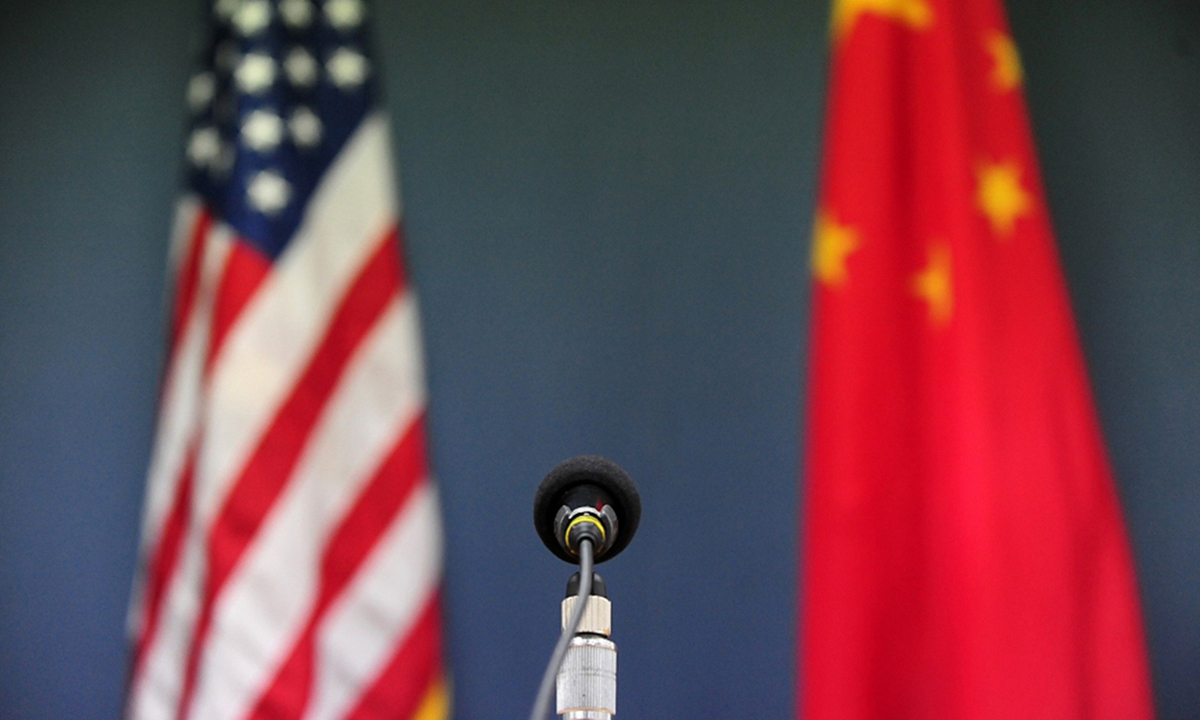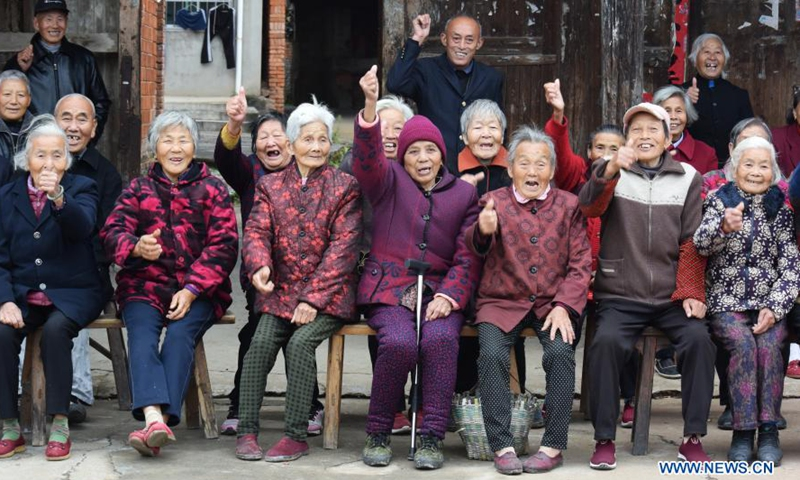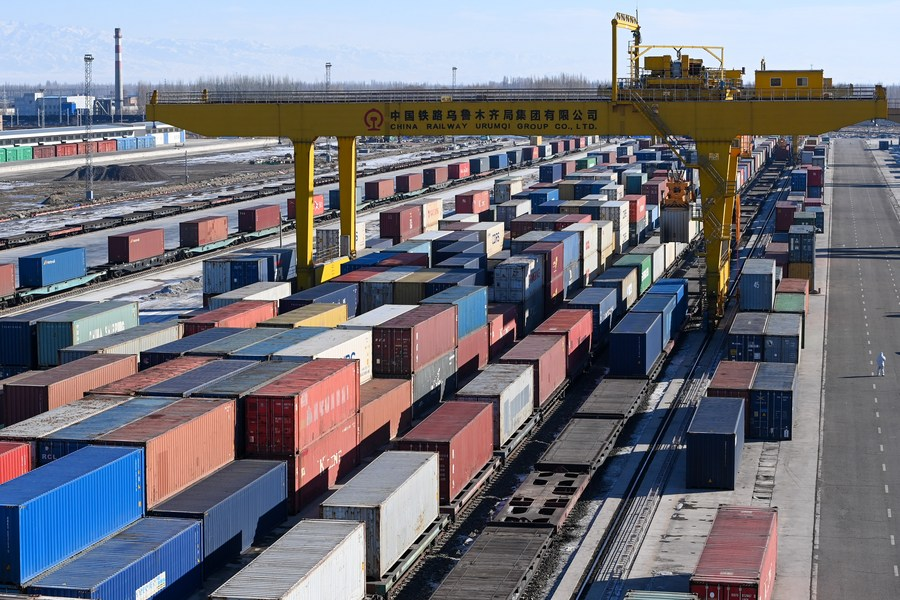1
China provides certainties amid turbulence in ties; properly managing Taiwan question a 'pressing task'

China's development prospects, US policy, commitment to bilateral trade cooperation and multilateral consultation with the US remain "certain" although China-US relations are facing mounting uncertainties, said Chinese State Councilor and Foreign Minister Wang Yi during a trip to the US, as he emphasized that managing the Taiwan question is the "pressing task" in bilateral ties.
During a meeting with former US secretary of state Henry Kissinger in New York on Tuesday, Wang said the pressing task is to properly manage the Taiwan question or it would have a disruptive impact on China-US relations. The US needs to adopt a rational and practical policy toward China, return to the right track of the three China-US joint communiqués, and safeguard the political foundation of China-US relations.
Kissinger recalled the signing of the Shanghai Communiqué with Chinese leaders in 1972 and said the US should recognize the extreme importance of the Taiwan question for China. The two countries need dialogue, not confrontation and should forge ties of peaceful coexistence.
Zhang Tengjun, deputy director of the Department for Asia-Pacific Studies at the China Institute of International Studies, said that Wang Yi's conversation with Kissinger, an important person behind the normalization of US-China relations 50 years ago, sends a clear message that the one-China principle is the basis for bilateral relations to return to a normal track.
US President Joe Biden had pledged the "Five Nos" - not seeking a "new cold war," not seeking to change China's system, that the revitalization of its alliances is not against China, that it does not support "Taiwan independence" and it does not look for conflict with China. However, the US' actions run counter, Wang noted.
Biden told CBS' 60 Minutes program on Sunday that US military personnel would defend Taiwan in the event of a "Chinese invasion." The White House, after the interview, clarified Washington's official policy on Taiwan has not changed, CBS reported.
The situation is clear that the US keeps hollowing out its one-China policy and its commitment over the Taiwan question so it can strangle China in the chip and semiconductor sector and amplify its democracy vs authoritarian narrative, Wang Yiwei, director of the Institute of International Affairs at the Renmin University of China, told the Global Times on Tuesday.
While the US has been eroding the basis for bilateral ties and thereby creating uncertainties, Wang Yi reiterated China's consistent stance on the relationship and reminded today's US strategists to think about the ice-breaking decades ago, Diao Daming, an associate professor at Renmin University, told the Global Times.
In a meeting with representatives from the National Committee on US-China Relations, the US-China Business Council and the US Chamber of Commerce in New York on Monday US local time, Wang Yi said this year marks the 50th anniversary of former US president Richard Nixon's visit to China and the signing of the Shanghai Communiqué. It is an important year to take stock of the past and carry on from a new starting point. But one may find less certainty and more uncertainty in the prospects of China-US relations. In that context, Wang Yi talked about the five certainties China can provide.
China's development prospects are certain and will create bigger markets and development opportunities for the US and other countries.
China's resolve to further advance reform and opening-up is certain and will continue to advance economic globalization.
China's policy toward the US is certain and the most critical thing now is for the US to adopt a rational and practical policy toward China sooner rather than later.
China's commitment to closer bilateral trade and economic cooperation is certain.
China's readiness to engage in multilateral consultation with the US is certain. For that to happen, it is vital to protect the political foundation for China-US relations and in particular, uphold the one-China principle.
China-US relations bear on the future of the two countries and the peace and stability of the world. The two sides need to work together to find a way for the two major countries with different social systems, histories and cultures to get along, Wang Yi said.
Diao noted when China keeps injecting certainties amid bilateral turbulence, the US needs the courage, like policymakers did 50 years ago, to properly handle bilateral relations. The US should behave in line with the interests of the country and the people rather than for some special interest groups or stick to the myth that the US' internal development problems can be solved by fabricating an external threat, Diao said.
If the US continues to talk the talk without walking the walk, China is prepared for intense confrontation, the expert said. There are opportunities for adjustment, but whether bilateral relations have room for such adjustment depends on the US' actions, Diao said. It is impossible that the US on one hand keeps jeopardizing the atmosphere for dialogue and on the other hand dreams of dialogue and cooperation.
Media Source: Global Times
2
China to be a severely aging society by 2035; quick aging, large population pose challenges: health authority

China will be a moderately aging society in three years with 20 percent of the population aged 60 years and above and become a severely aging society by 2035 when 400 million people are 60 years and above, accounting for 30 percent of the population, a health authority official announced at a Tuesday press briefing where he introduced the country's arrangement to cope with the scenario.
Wang Haidong, director of the National Health Commission's Department of Aging and Health, said China's aging problem involves a large population and is rapidly growing, citing those numbers.
The aging situations varied greatly in different places. Aged population in rural areas is larger, and the aging problem is also more severe than in urban areas, Wang said. Data collected for 2020 showed 10 provincial-level regions have more than 20 percent of its population aged 60 years and above, mostly in Northeast and Southwest China.
Wang also noted the great pressure to cope with the aging scenario. The number and percentage in population of elderly people, the old-age dependency ratio (old, dependent population divided by working population), and social dependency ratio (young, dependent population included) will peak around 2050. It will pose great challenges to public services accessibility and the sustainability of social security system.
China will be implementing national strategies for the situation and figure out a unique path to cope with it, Wang said.
Speaking about the development in care of the elderly, Wang said as of 2021, pension system covered 1.03 billion and the health insurance covered 1.36 billion of the 1.4 total population. Long-term care services are pioneered in 49 cities, covering 145 million people.
There have been 8 million beds in 360,000 care centers as of first quarter of 2022, and more than 1.75 million beds in medical-care centers nationwide.
More than 40,000 learning centers are established for the elderly to study while cultural facilities and tourist sites are open to them for free or at discounted prices to encourage the elderly to participate in recreational activities, Wang said.
Media Source: Global Times
3
Goal for Central Asia trade on track

Target to lift value to $70b 'completely achievable', Chinese diplomat says.
A goal to ramp up trade between China and the five Central Asian countries to a combined $70 billion a year is "completely achievable", a senior Chinese diplomat said on Tuesday.
"Achieving the goal also serves the common wishes of China and five Central Asian nations," Liu Jiangping, deputy director-general of the Chinese Foreign Ministry's Department of European-Central Asian Affairs, told a news briefing in Beijing following Chinese President Xi Jinping's trip to the region last week.
Trade between China and the Central Asian nations stood at $38.6 billion in 2020, data from the Ministry of Commerce shows.
Despite the pandemic-induced slump in global trade, China's trade with its Central Asian neighbors has increased, said Liu, referring to growth rates in the double digits with some of these countries.
Collaboration on the economy and trade was high on the agenda when President Xi held separate talks with leaders of the Central Asian countries during the trip, she added.
Xi chose the region for his first trip abroad in more than two years, starting in Kazakhstan before heading to Samarkand, Uzbekistan, for the 22nd summit of the Shanghai Cooperation Organization, or SCO, which ended on Friday.
Liu said the leaders' meetings highlighted the need to further tap the potential of collaboration on economy and trade, boost the scale and scope of trade cooperation and further improve trade structures.
"The future improvement of both quality and scale of trade will inject strong dynamism to the common development of China and the five countries," she said.
Challenges ahead
Sohail Khan, deputy secretary-general of the SCO, said the summit was held as the world faces a series of complicated challenges and a slew of regional conflicts and crises.
Also, technology gaps and digital divides are widening across the globe, financial markets are jittery, and some nations are raising barriers to the transfer of technologies as protectionism rises, he said.
The Samarkand Declaration issued by the meeting of the SCO Council of Heads of State "manifests the shared position among the member states and charts a course for the path of the grouping's future development", Khan said.
In particular, the deputy secretary-general highlighted the four joint statements passed by the leaders on keeping supply chains and productions chain afloat, while addressing food security, energy security and climate change.
Interactions among the SCO member states are frank, sincere and open, with all members subscribing to the principles of the organization, Khan said.
He stressed the need to further develop interconnectivity and economic corridors among the member states and champion the region's peace and stability.
In the briefing, Liu said: "The progress made by the SCO at the summit about its expanding membership shows that it is not a closed or exclusive small circle but a big family.
"The expanding membership shows that an increasing number of countries recognize the Shanghai Spirit (of the organization), and the actions of hegemony and bullying are unpopular."
Parakhat Durdyev, Turkmenistan's ambassador to China, underlined the need for countries to further join hands in championing global security and stability.
He said his country strongly opposes confrontation and unfair competition, and supported efforts to settle conflicts.
Media Source: China Daily
4
China's oil reserves reach 3.69 billion tons

By the end of 2021, China's oil and natural gas reserves reached 3.69 billion tons and 6.34 trillion cubic meters respectively, according to the 2022 China Mineral Resources report released by the Ministry of Natural Resources.
Breakthroughs were made in oil and gas exploration in several basins including Ordos Basin, Junggar Basin, Tarim Basin, Sichuan Basin and Bohai Bay Basin.
Last year, the investment in geological exploration of non-oil-gas minerals achieved positive growth for the first time since 2013, the report said.
China also made significant progress in geological exploration of non-oil-gas minerals. In 2021, 95 mineral deposits were discovered throughout China, including 38 large, 34 middle and 23 small deposits.
Media Source: China Daily